

MOOCs are not the answer to our education challenges. When MOOCs (Massive Open Online Courses) were launched a few years ago, many observers felt that they would change the face of education.

When some of the world’s leading business schools joined the MOOC revolution, people finally took notice of the potential. Finally, world-class education would be available to the masses, and that too for free! Over the last few years, MOOCs have shown impressive growth numbers. Class Central—the MOOC aggregator from top universities—notes that there were 35 million students enrolled in MOOCs in 2015, up from 18 million in 2014. Impressive. It’s easy for observers sitting in India—the country faces a huge demand-and-supply mismatch when it comes to higher education—to feel that MOOCs are the answer to our higher education challenges.
Need-to-Know News: Chatbots – the New Online Teaching Assistant and Credit-worthy MOOCs Go Global. 1.
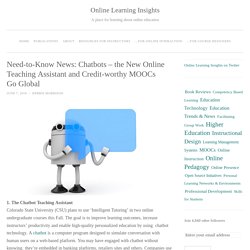
The Chatbot Teaching Assistant Colorado State University (CSU) plans to use ‘Intelligent Tutoring’ in two online undergraduate courses this Fall. The goal is to improve learning outcomes, increase instructors’ productivity and enable high-quality personalized education by using chatbot technology. A chatbot is a computer program designed to simulate conversation with human users on a web-based platform. You may have engaged with chatbot without knowing; they’re embedded in banking platforms, retailers sites and others. Companies use chatbot software to respond to customer requests for basic and frequently asked questions. A professor of an online Computer Science course at Georgia Tech thought so. Jill came to be after Goel decided he and his teaching assistants were being spread thin. Insight: The education sector is sensitive to robot technology as a replacement for teacher interaction as we’ve seen with automated essay grading software (Larson, 2013).
Digging deeper into learners’ experiences in MOOCs – infographic. Opportunities and Threats of the MOOC Movement for Higher Education: The European Perspective. By Robert Schuwer, et al; IRRODL Most of the literature focus on the origin of the MOOC movement in the US.
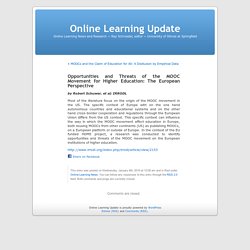
MOOCs and the Claim of Education for All: A Disillusion by Empirical Data. By Matthias Rohs and Mario Ganz, IRRODL.
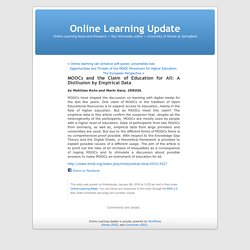
Big trends in digital education: The MOOC is in session. Collections matching "EMOOCs 2014" White House science council recommends U.S., accreditors support MOOCs. President Obama’s Council of Advisors on Science and Technology has a message for the federal government and regional accreditors: Go easy on the MOOCs.
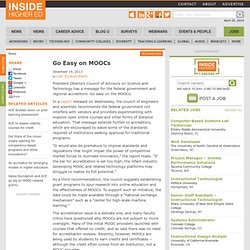
In a report released on Wednesday, the council of engineers and scientists recommends the federal government not interfere with vendors and providers experimenting with massive open online courses and other forms of distance education. That message extends further to accreditors, which are encouraged to waive some of the standards required of institutions seeking approval for traditional programs. “It would also be premature to impose standards and regulations that might impair the power of competitive market forces to motivate innovation,” the report reads. Online classes can be enlightening, edifying, and engaging — but they're not college. The future of higher education online is, at present, clear as mud.
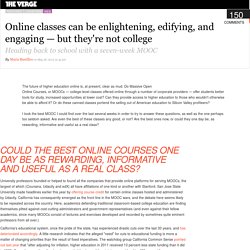
Do Massive Open Online Courses, or MOOCs — college-level classes offered online through a number of corporate providers — offer students better tools for study, increased opportunities at lower cost? Can they provide access to higher education to those who wouldn't otherwise be able to afford it? Or do these canned classes portend the selling out of American education to Silicon Valley profiteers?
I took the best MOOC I could find over the last several weeks in order to try to answer these questions, as well as the one perhaps too seldom asked: Are even the best of these classes any good, or not? Are the best ones now, or could they one day be, as rewarding, informative and useful as a real class? University professors founded or helped to found all the companies that provide online platforms for serving MOOCs, the largest of which (Coursera, Udacity and edX) all have affiliations of one kind or another with Stanford.
Massive Open Online Courses and Beyond: the Revolution to Come. Saturday, 17 August 2013 10:30By Michael A Peters, Truthout.
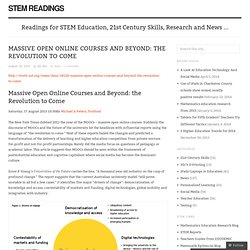
Infographic: How will the MOOCs make money? By David Holmes On August 22, 2013 Like many newfangled fields in startup world, massively open online colleges or MOOCs (catch our explainer here) are treated with a mix of starry-eyed hope and sobering skepticism.
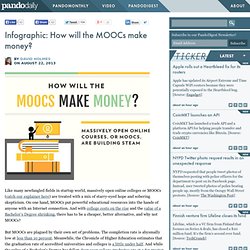
On one hand, MOOCs put powerful educational resources into the hands of anyone with an Internet connection. Massively Online And Offline Too: How MOOCs Will Evolve In The Physical World. MOOCAdvisor. MOOCs: A Disruptive Innovation or Not? Nearly five years ago on October 27, 2008 Clayton Christensen and Michael Horn briefed participants at an American Enterprise Institute [AEI] meeting on “Disruptive Innovation in Education and Health Care.”
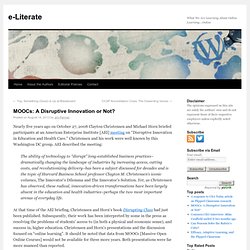
Christensen and his work were well known by this Washington DC group. AEI described the meeting: The ability of technology to “disrupt” long-established business practices–dramatically changing the landscape of industries by increasing access, cutting costs, and revolutionizing delivery–has been a subject discussed for decades and is the topic of Harvard Business School professor Clayton M. Christensen’s iconic volumes, The Innovator’s Dilemma and The Innovator’s Solution. Yet, as Christensen has observed, these radical, innovation-driven transformations have been largely absent in the education and health industries–perhaps the two most important arenas of everyday life.
At that time of the AEI briefing, Christensen and Horn’s book Disrupting Class had just been published. L. MOOCs, Robots, and the Secret of Life. For the last two years, MOOCs have dominated the national conversation on technology and the economics of higher education. But for all the talk of whether they’ll usher in a new age of democratized global learning or destroy higher learning as we know it (or possibly both at the same time), it’s been hard to get a handle on MOOCs are, and what they can be.
A lot of MOOC journalism has been like this , wherein a general-interest magazine writer signed up for 11 courses, finished one of them (the easiest, apparently), and formed his opinions accordingly. On the theory that to understand an educational experience you should actually experience it, I’ve spent the last four months taking two MOOCs. Now I’m done, and this is what I learned. The first was Introduction to Philosophy , from Coursera (also the one class MOOC dropout guy finished, coincidentally.) And beyond the brevity, Introduction to Philosophy was missing important things.
My second MOOC experience was very different. The New MOOC Strategy: Rise of the Higher Ed Empires. Untitled. 302 Found. COOCs Over MOOCs : New England Board of Higher Education. Massive open online courses (MOOCs) are all the rage these days and are being offered as a potential way to shorten the degree-attainment process and thereby reduce costs.

With escalating tuition at public and private institutions and shrinking median household income, the energy around MOOCs is fueled by the question often asked by students, parents and policymakers: Can a meaningful higher education be provided at a reasonable price? The answer to this question is yes, but affordability should not be implemented at the expense of quality nor at the risk of vitiating a degree as a widely accepted credential. MOOC-induced educational blindness: Demotivation and confusion as intrinsic properties of schooling. Why on earth am I writing about MOOCs again?
I’m not sure why I have this instinct to defend MOOCs. I am generally the last person to be instinctively bullish on purely technological innovations in education even if I tend to be one of the first people to try them out. Confusing MOOC shortcomings with the failures of schooling in general The thing that galls me is this tendency of MOOC critics to criticise problems as being specific to MOOCs whereas in fact, they are problems faced by education in general. Clay Shirky outlined the myth of “all college is like Harvard” in this excellent blog post.
Top Ed-Tech Trends of 2012: MOOCs. Part 5 of my Top Ed-Tech Trends of 2012 series The Year of the MOOC. Donald Clark Plan B: MOOCs: taxonomy of 8 types of MOOC. We're not payin' because this guy... ...this guy's a fuckin' mooc. But I didn't say nothin'. And we don't pay moocs. A mook? I'm a mooc?
Yeah. What's a mooc? I don't know. Anti-MOOC advocacy. MOOC, SPOC, DOCC, Massive Online Face2Face Open . . . (Uh Oh!): Age of the Acronym. On Facebook, my pal John recently joked that we're not living in the Digital Age. What’s the Difference Between OCWs and MOOCs? Managing Expectations. By david on August 20, 2013. Report: Course Topic Biggest Motivator for MOOC Participation. Research | News Report: Course Topic Biggest Motivator for MOOC Participation. Udacity CEO Says MOOC 'Magic Formula' Emerging - Education - Online. Sebastian Thrun dishes on Udacity's Silicon Valley style and how to make massive open online courses work for more than "the most motivated 1%.
" After weathering a round of negative publicity, Udacity CEO Sebastian Thrun believes vindication is at hand. Welcome to this blog on Connectivism. Aren’t we all going back to basic – with the xMOOCs based on the instructivism as a basic learning pedagogy? Open University Learning Design Initiative (JISC-OULDI) project. JISC-OULDI is a Jisc-funded project supported by the Institutional Approaches to Curriculum Design programme . Donald Clark Plan B. As the MOOCosphere expanded, more and more platforms sprung into action. Trying to find useful things to do with emerging technologies in open education. School of Education professors to offer MOOC on video game learning.
Two professors with UW-Madison’s School of Education will be offering a free online course about video games and learning via a new delivery system in higher education known as Massive Open Online Courses, or MOOCs. Constance Steinkuehler and Kurt Squire are teaming up to teach a course called, “More than a High Score: Video Games and Learning.” MOOC_Final. Amnesimooc. You can probably dismiss this post as 'stop being defensive', but I'll log it now while it occurs to me. As I mentioned in a previous post, the sudden interest in MOOCs from mainstream universities and the media is exciting, and has a number of benefits, but is not without its pitfalls.
The MOOC Guide.